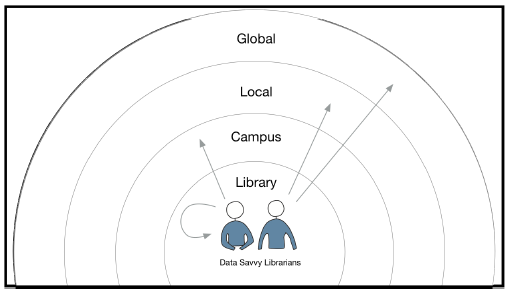Blog Posts | October 17, 2016
Share ThisBy Ashley Sands
Senior Program Officer, IMLS Office of Library Services
IMLS recently announced 41 awards made through the National Leadership Grants for Libraries program (NLG), the Laura Bush 21st Century Librarian program (LB21), and Sparks! Ignition Grants for Libraries program (Sparks). Among these awards, we are pleased to support a number of projects seeking to understand and sustain the role of academic libraries in research data management. The three projects highlighted in this post represent a total investment of nearly $200,000. Click the log number for each grant to access more information, including selected documents from each grant proposal.
Research data management (RDM) is a growing component of academic library services. As an emerging role, the necessary infrastructures (technical, social, and workforce) to support these services must be investigated at a national level. Under the IMLS National Digital Platform project portfolio, we are committed to funding awards that investigate, support, sustain, and broaden the impact of local investments in research data management infrastructures and services.
Understanding the Role of Academic Libraries in Research Data Management

One of the projects funded in this cycle will analyze the role of libraries in RDM by holistically examining RDM in a single library setting. By more closely understanding the needs of various stakeholders, this project will contribute to our shared sense of sustainable and scalable RDM roles for libraries.
A $49,844 LB21 planning grant awarded to the University of Kentucky (RE-32-16-0140-16) will conceptualize a research data services model for academic libraries. The project team will conduct a multi-method study to investigate the current state of research data services, needs of potential patrons, and perceptions and opinions of heterogeneous stakeholders, such as librarians, administrators, and scholars. A conceptual data services model will be produced, which will identify types of data services, associated resources necessary for services, platforms, necessary librarian knowledge and skills, and corresponding librarian education plans.
Sustaining the Role of Academic Libraries in Research Data Management
While the first project aims to understand the role of libraries by analyzing a full library setting, two other projects will instead focus on sustaining specific aspects of the library role in RDM. One project will bring together stakeholders to better understand the strengths and weaknesses in expertise of existing library RDM workforces. The other aims to plan development of a tool to better sustain research data and software in the academic library environment. Each of these deep dives benefits ongoing work to understand and sustain the role of academic libraries in research data management.
Through a $97,911 LB21 national forum grant, the University of Pittsburgh School of Information Sciences (RE-43-16-0149-16) will convene communities with a range of experiences and perspectives to articulate a vision and roadmap for data science in libraries. The project focuses on both skills and management gaps; overcoming these gaps is crucial for connecting and interconnecting libraries to the other domains already transformed by data science. The project aims to articulate a vision for data science in libraries, develop a roadmap for continuing education in data science for librarians, and provide guidance for library administrators managing data-intensive teams.
The University of Notre Dame’s Hesburgh Libraries (LG-72-16-0122-16) will conduct a $45,590 NLG planning effort to address needs for preserving data and software. The goal is to collaboratively design an interoperable and repository agnostic Data and Software Preservation Quality Tool. The planning process will consider existing solutions to better represent digital workflow methodologies, improve data and software provenance, automatically enhance metadata, perform schema validation, improve file format recognition, interoperability, data integrity, and ultimately facilitate reproducibility. Information gathered during panels, workshops, and meetings will be preserved and shared transparently using a free online presentation sharing service. This input will form the basis for a collaboratively authored planning report, which will include detailed technical and administrative project plans.
